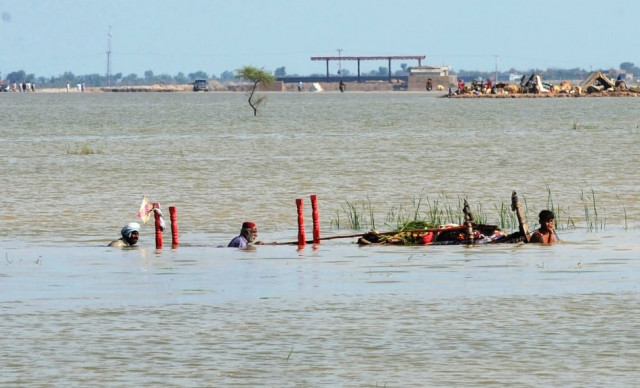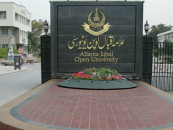UNESCO asked to provide early warning system
Met office chief says flooding occurs when water from glacier melts

PHOTO: AFP
Currently, Pakistan lacks scientific data on glacier melting and without it the country cannot prevent the annual flooding in the country.
Every year massive amount of water from melting glaciers is mixed with the monsoon rainwater in the major reservoirs of the country and is later dumped into the sea, said Met office chief Dr Ghulam Rasul.
Three-year data: Monsoon flooding claimed 1,029 lives
It is estimated that every year an amount of 30 to 40 million acres feet of rainwater during monsoon is being dumped into the sea in Pakistan.
Devastating floods are integral part of the history of Indus Basin which is habitat to more than 200 million people. Catastrophic floods of recent past broke the historical records and became a challenging threat to human beings, livestock, property, infrastructure and ecology.
Dr Rasul raised this important point at an international workshop on ‘Strategic data for reliable models and timely flood forecast’, which concluded here on Tuesday.
While talking to The Express Tribune, he said that currently Pakistan lacks accurate and updated scientific data on melting glaciers.
“Since ages Pakistan is using data on glacier melting based on estimations, some say it is 70 per cent, some 80 per cent and so on,” he said.
He said a need has been felt to have a model to gather data on melting glaciers for better calibration and simulation.
“It will help Pakistan know when the temperature has risen in northern areas when glaciers start melting and how much water is coming into the reservoirs,” he said.
Flash floods kill 43 in parts of K-P
Therefore, pre-emptive measures can be taken easily before the water from glacier melting is stocked in reservoirs during the monsoon season, he said.
“One of the major reasons behind flooding in Pakistan is that water from both glacier melting and monsoon rains gathers simultaneously in the reservoirs due to which they overflow and generate flooding,” he said.
Once having data on it will help conserve water separately for various purposes when required, he said.
Protecting humans and natural resources as well as infrastructure demanded immediate attention. UNESCO, through International Hydrological Programme, Regional Science Bureau for Asia and the Pacific and Islamabad office, is working close with the government of Japan through Japan International Cooperation Agency to support the government of Pakistan in meeting flood related challenges.



















COMMENTS
Comments are moderated and generally will be posted if they are on-topic and not abusive.
For more information, please see our Comments FAQ